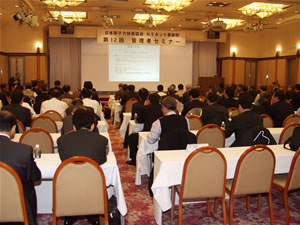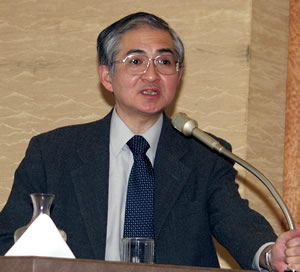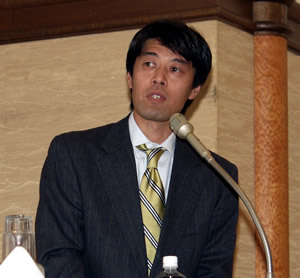|
|
 |

|
The 12th Managers' Seminar was held at the Tokyo Grand Hotel in Minato-ku, Tokyo on December 15, 2006 with approximately 120 manager-class personnel from member organizations in attendance.
After the opening salutation by executive director Noda, two lectures were delivered focusing on the human factor and the organization factors that exert influence upon the human factor and the underlying safety culture, and members shared cognizance of endeavors in that regard.
|
|
Lectures
First Session
Lecture Title:
"Troubles Rooted in Human Factors and Prevention Thereof"
Professor Akinori Komatsubara, Waseda University Faculty of Science and Engineering, Department of Industrial and Management Systems Engineering
|
|

|
|
Mr.Komatsubara
|
The professor presented an introduction to human-factors engineering and lectured on the relationship between human error and accidents, and emphasized the following points:
·Human error could be called the mismatch between objectives (what needs to be done) and results (what actually gets done).
·If "difficult" things such as difficult to see, difficult to hear, difficult to remember and the like are left unattended to, human error will occur without fail.
·Humans have a tendency to act arbitrarily in accordance with mistaken impressions based on their own past experiences and the situation at hand, and the more experience a person has, the more likely this mistaken-impression type of error is to occur.
·Errors easily occur just before or after the main portion of important jobs.
·Accidents can best be prevented by strictly adhering to the well-known "ABC rule of accident prevention," Avoid Being Careless.
|
|
Second Session
Lecture Title:
"Considering Risk Management from the Aviation Control Site"
Mr. Shigetoshi Komai, Air Traffic Controller, Tokyo Regional Civil Aviation Bureau Tokyo Airport Office, Ministry of Land, Infrastructure and Transport
|

|
|
Mr.Komai
|
Mr. Komai gave examples of aviation troubles and lectured on the following topics in regard to reducing troubles:
·The aviation industry was relatively quick to learn lessons from past experiences of accidents and endeavor in research into the human factor, and vigorous countermeasures against human error were implemented by applying those results to education and training. The fact that numerous troubles continue to occur to this day despite these efforts is an attestation to the difficulty of maintaining safety.
·Taking up and investigating three cases of trouble that occurred in 2005 and 2006, we learned that in every case, problems with the organization management had a major impact, though the human error that occurred on-site were the direct causes. In addition, it was deduced that the fierce competition that accompanied deregulation and the high fuel costs had exerted an influence on management.
·As a consequence of these results, it has become apparent that in order to eliminate all sorts of unsafe factors so as to maintain continuous safety, harmony between on-site tactical risk management and strategic risk management by the organization management is highly important. Therefore, four types of risk management -- information management, environmental management, personnel management, and situation management -- must be systematically put into practice.
·In summary, the three points of "improving the level of safety through untiring attentiveness," "carrying out risk management through organizational strategy and on-site tactical risk management," and "thinking about what you can do on your own before placing expectations upon others to act" were brought out.
|
|
A variety of opinions were expressed in the questionnaire session after the presentation, including the following.
In regard to the presentation by Professor Akinori Komatsubara, Waseda University Faculty of Science and Engineering, Department of Industrial and Management Systems Engineering,...
・I think it provided some excellent hints and food for thought by not merely introducing rules and countermeasures against human error, but instead by mainly introducing the backdrop behind and the way of thinking toward human error, and how we should cope with our own individual circumstances by taking into account the unique characteristics of each of our own work-places. I am thinking that I would like to launch an investigation into the "difficult to" matters.
・It made me realize the importance of thinking back to human nature when it comes to preventing human errors. Especially I felt that unless the actual meaning of rules and procedures are pondered upon at all times, and rules and procedures that have lost their meaning due to changes in the environment and the like are promptly reconsidered, the consciousness of complying with the rules becomes a mere empty shell.
・In this day and age when learning from one's mistakes is not an option, I believe it is important to clarify errors and perils and teach about them. I have learned that I should take the professor's words to heart. |
In regard to the presentation by Mr. Shigetoshi Komai, Air Traffic Controller, Tokyo Regional Civil Aviation Bureau Tokyo Airport Office, Ministry of Land, Infrastructure and Transport,...
・Mr. Komai appears to be under the pressure of being on-site and at the front line. I thought that this lecture harmonized well with Professor Komatsubara's lecture, as it allowed me to grasp an actual perception of the practical skills involved. Another good point was that the explanations contained plenty of pointers, such as how professionals are vulnerable to changes, and repeated minor successes can make a person thick-skinned in relation to risks.
・I realized the similarities between the aviation industry and the nuclear industry, and felt that we in the field of nuclear power have a lot to learn from the experiences of the aviation industry. It seems that the disparity in experience is proportional to the lead in the length of history held by the aviation industry.
・To me, the combination of on the job experience and objective data was very convincing. The "tough times that the airline industry is going through" just now could be applied to just about any business enterprise, and trying to maintain safety under those circumstances is no simple matter, I would guess. And I realized that society on the whole needs to share in the awareness of the need to allocate more funds to safety. |
|
|







